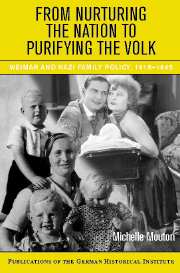Book contents
- Frontmatter
- Contents
- Acknowledgments
- List of Abbreviations
- Introduction
- 1 Marriage Policy in Turmoil
- 2 Divorce
- 3 From Mother's Day to Forced Sterilization
- 4 Alleviating the Burdens of Motherhood
- 5 Maternal Morality versus Infant Mortality
- 6 Forming Families beyond Blood Ties
- 7 Conclusion
- Bibliography
- Index
7 - Conclusion
Published online by Cambridge University Press: 05 January 2013
- Frontmatter
- Contents
- Acknowledgments
- List of Abbreviations
- Introduction
- 1 Marriage Policy in Turmoil
- 2 Divorce
- 3 From Mother's Day to Forced Sterilization
- 4 Alleviating the Burdens of Motherhood
- 5 Maternal Morality versus Infant Mortality
- 6 Forming Families beyond Blood Ties
- 7 Conclusion
- Bibliography
- Index
Summary
During both the Weimar and National Socialist eras, many Germans perceived the family to be the critical foundation upon which Germany's future depended. In political debate, policy formation, and unofficial discourse, Germans articulated the view that the nation's survival rested on a revival of marriage and motherhood. Providing German men and women with the security needed to bear children would, they hoped, usher in economic prosperity, create social stability, and raise moral standards. Through family-directed legislation, both Weimar and National Socialist policymakers sought to raise the birthrate, decrease infant mortality, and improve public health. Since the two regimes had a number of aims in common, some historians have viewed their family policies as developing in a continuous line. Indeed, certain programs introduced by the Weimar governments were continued by the Nazis once they took power. During both eras, policymakers advocated the use of marriage certificates, financed kindergartens, and celebrated Mother's Day. And yet, as this study has demonstrated, a dramatic transformation in family policy followed the Nazi takeover. Parliamentary debates gave way to monolithic decrees as the Nazis introduced a race-based ideology and showed a much greater willingness to intervene directly into families. The result was fundamental change in both the aim and impact of family policy.
During the Weimar era, lawmakers across the political spectrum agreed that the German family was critical to social stability and that the war had dangerously weakened the family.
- Type
- Chapter
- Information
- From Nurturing the Nation to Purifying the VolkWeimar and Nazi Family Policy, 1918–1945, pp. 272 - 282Publisher: Cambridge University PressPrint publication year: 2007



